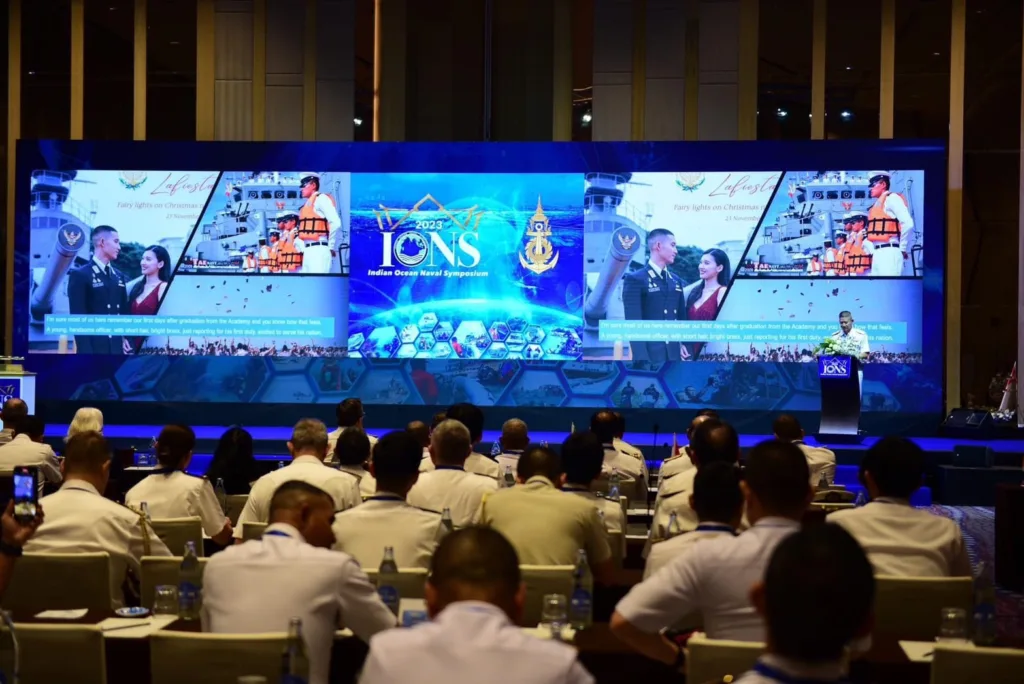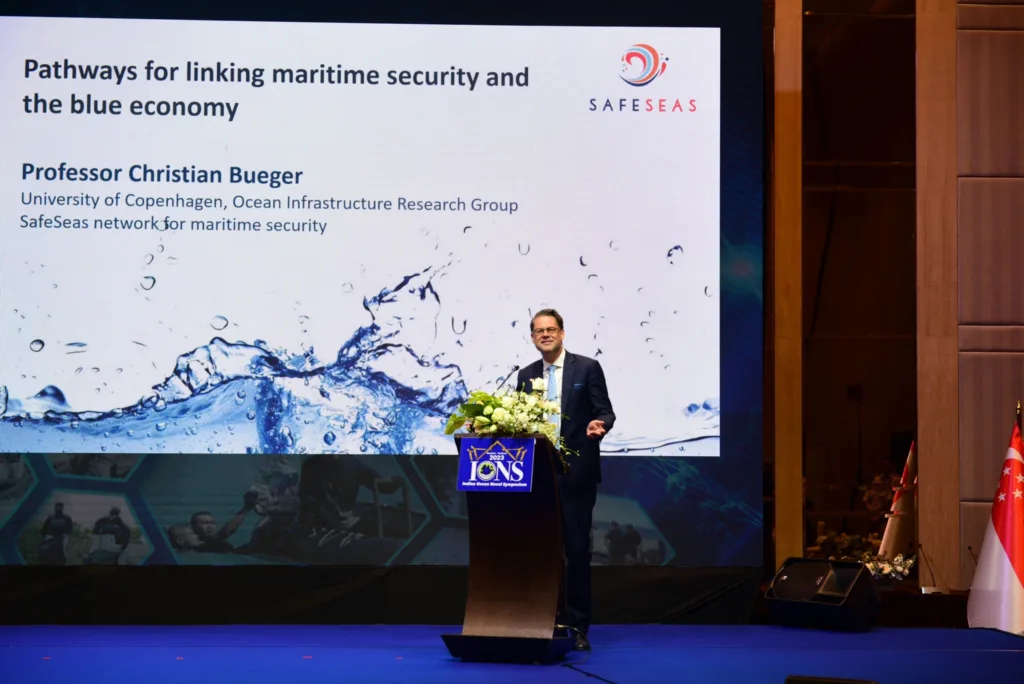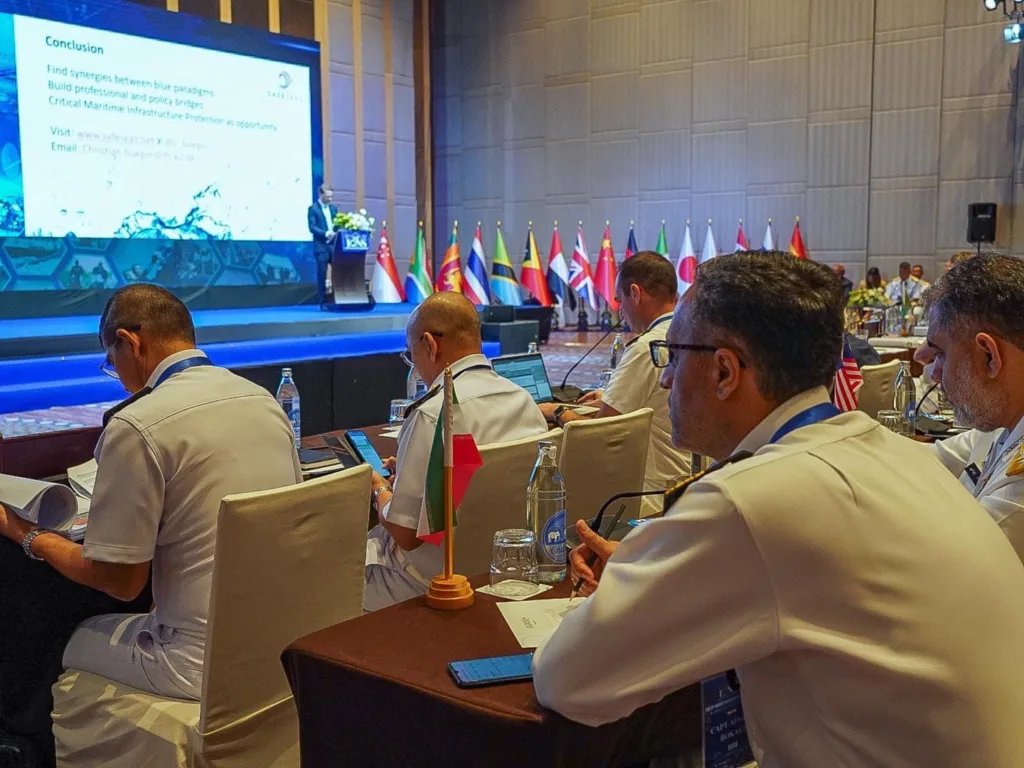In December 2023 I had the pleasure to participate in the 8th Indian Ocean Naval Symposium organized by the Thai Navy.
The Indian Ocean Naval Symposium (IONS) is one of the most important maritime security arrangement in the region. It is the only format that brings security actors from south east Asia, the bay of Bengal and the western Indian Ocean together to discuss security at sea. It also includes important maritime states, including China, Germany, Italy, Japan and Russia as observers.

What is IONS?
IONS, initiated in 2008, meets in different formats: the conclave of chiefs, three working groups and an academic seminar. This is complemented by exercises as well as a journal that publishes essays of relevance to navies in the region.
While the conclave performs important diplomatic functions, and the seminar is important to elaborate and discuss strategic ideas and observations, the workhorse of IONS are the working groups. These focus on humanitarian and disaster relief, information sharing and interoperability, and crosscutting issues of maritime security. They are in essence bodies where joint standards for navies in the region are developed.
Since three Information Fusion Centers operate in the region (based in Singapore, India, Madagascar), IONS is also important to ensure that these centers work towards a common picture of trends and needs for operations at sea. Lastly, IONS is a format where navies of the region can develop inter-personal relations, establish informal channels of communications between navies and develop maritime security communities of practice.
Operational focus and environmental security
The chairmanship of IONS rotates every two years. In 2023 Thailand succeeded France in chairing. The main focus of the French navy was to enhance the operational focus of IONS – including by organizing exercises – but also to strengthen its outlook on environmental security.
Such questions are cross-cutting. They imply that navies are better prepared for climate change related disasters, including pollution incidents, that navies reduce their environmental footprint, but also contribute to fighting environmental crimes at sea, such as pollution or illegal fishing.
Thailand continues and expands this focus of IONS through an exploration of the role of navies in safeguarding the blue economy. This was the key theme of the meeting held in December 2023 which I had the pleasure to attend.
Linking maritime security and the blue economy
Maritime security and the blue economy are widely seen as complimentary objectives. Low levels of maritime security are the needed condition for investing in the blue economy. Blue economy development creates the wealth needed to fund maritime security activities, and reduce the incentives of coastal populations to engage in blue crimes.
Both maritime security and blue economy thinking are ‘blue paradigms’ that aim at rethinking ocean governance in an age characterized by growing dependency on the sea and its infrastructures. Yet often both discussions are held in separate forums, with security actors paying too little attention to their role in conservation, restoration and resource management, while ocean development discussions often sideline the importance of law enforcement and security in processes such as maritime spatial planning. Thailand, hence, leads here a very important agenda for IONS.

What the link between maritime security and blue economy means in operational practice is however often difficult to establish. One challenge is that there is a plethora of competing definitions and understandings of both concepts, with attempts at definition ending up so abstract and vague that they offer little guidance for action.
This presents however also an opportunity – an opportunity to recognize and learn from the diversity of how countries relate to the sea, how they organize their ocean governance system, economies and policies. Countries substantially differ, and it is hence difficult to explain why India, Seychelles and Indonesia for instance should have precisely the same definitions.
The goal must be to find common grounds. Maritime security and blue economy point to the need of better integrating policy, operational coordination across the agencies that deal with the sea, opportunities for developing better data on maritime activities and working closer with non-governmental actors, such as ocean industries and civil society organizations. Climate change is a common challenge.

Critical Maritime Infrastructure Protection
As I suggested in my keynote address at the 2023 Bangkok meeting, one way of linking up these objectives is through the debate on Critical Maritime Infrastructure Protection. The sea today hosts an increasing range of infrastructures: energy platforms, pipelines and electricity cables, internet cables, fish farms, to name just some. Indeed, when we are talking about blue economy, we mainly speak about the profits generated from these infrastructures.
Infrastructures face a wide range of threats, ranging from natural disasters, accidents, blue crimes, to greyzone activities and terrorism. Protecting infrastructures from these threats to ensure there functioning is one of the objectives of navies (in cooperation with other actors).